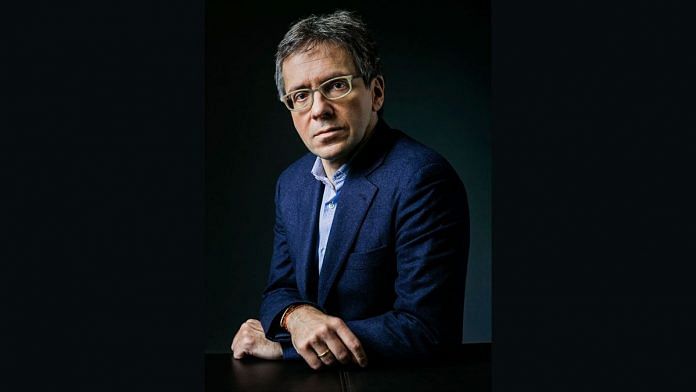New Delhi: When it comes to leadership in the current global order, we’re in a “world of fragmented leadership” and “G zero” would much better describe our world than G7 or G20 or G2’, according to Ian Bremmer, political scientist and president of the Eurasia Group, a political risk consultancy.
In conversation with ThePrint’s Editor-in-Chief Shekhar Gupta, during a virtual session of ‘Off The Cuff’, Bremmer, who is also the founder of digital media firm GZERO Media, discussed the lack of global leadership in the current international system and how progress in the world has still continued partly due to crises.
While discussing the numerous crises posing a threat to the world today – from global health emergencies to disruptive technologies – he said individuals, companies and non-governmental organisations including the European Union, Mike Bloomberg, Greta Thunberg, Antonia Guterres among others, are playing a much bigger role today in shaping the global order and responding to emergencies than leaders such as Joe Biden, Donald Trump and Emmanuel Macron.
Bremmer also delved into the controversy surrounding billionaire Elon Musk’s Twitter deal and looked at the implications of his words, from publicly discussing his views on Ukraine surrendering to the Russian invasion to Russian state media using Musk’s public support of President Vladimir Putin’s proposals to promote propaganda in the country.
“He (Elon Musk) had been speaking with Putin, he believed that this war was going to get much worse unless we found a way to negotiate. Putin’s negotiation principles were non-starters. You shouldn’t take Putin’s word at face value”, said Bremmer, while discussing why one should watch Musk’s actions carefully in this sensitive political situation between Russia and the US.
During the conversation, he also explained the growing trend of Europe moving towards the US and Qatar among other countries for energy resources and looking away from its dependency on Russian energy. He also touched upon the rising trend of the Right in the region. Bremmer also decoded the consequences Putin or any other future Russian leaders will face after the end of the Ukraine crisis.
Furthermore, looking at the political conditions in the United States and its influence on the world order, Bremmer also explored the hypothetical possibility of Trump still leading the superpower and its possible impact on the Russian invasion of Ukraine.
“I do think that Putin would have been less likely to invade Ukraine if Trump were president because he would have no idea how Trump would react”, said Bremmer as he examined how Putin’s perception of Biden as ‘weak’ further encouraged the Russian leader to invade Ukraine. He also elucidated on the likelihood of Trump returning to power and the increasing possibility of a constitutional crisis, similar to the 6 January Capitol attacks that took place in the US last year.
Moving the focus to India, Bremmer further discussed the growing relationship between India and the US under the Biden administration.
“The United States is unhappy that India has radically stepped up its energy purchases from the Russians much more than the Chinese have. It is also unhappy that they haven’t supported the Americans in key votes in condemning the Russians”, he said while analysing India’s role as a QUAD partner as well as a leader of the global South. He also explored the growing unhappiness of the global South with the US, from its delayed appointment of ambassadors, especially in India, to the growing strength of the dollar and its alleged weaponisation.
The political scientist also shared his thoughts on the conspiracy theory that the North Atlantic Treaty Organization (NATO) may have pushed Putin into invading Ukraine as a means of bringing back the relevance of the organisation. Here, while spelling out the false nature of Putin’s pretext for the Russian invasion, Bremmer mentioned what can be called a ‘Bremminism’.
“What aboutism is the definition of cognitive dissonance creating insanity in people,” said Bremmer.
Towards the end of the discussion, Bremmer also explored the possibility of vaccine nationalism in future global health emergencies and a technological fix to the issue, while looking at the nature of future wars using disruptive technologies.
Also read: The West could have been braver in its approach to Russia-Ukraine war, says IISS’s Dr Chipman



